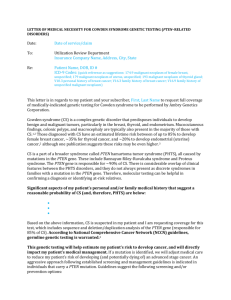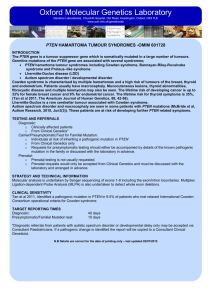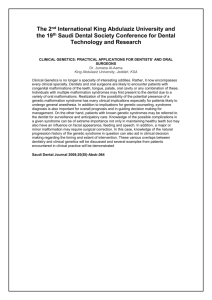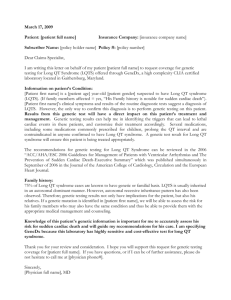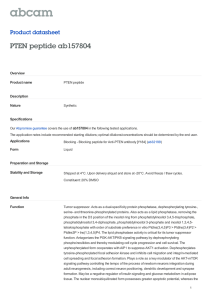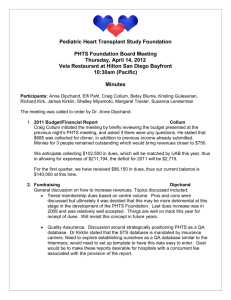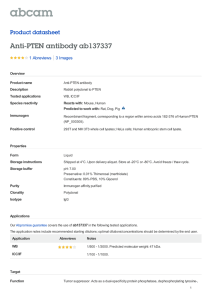PTEN-related disorders LMN
advertisement
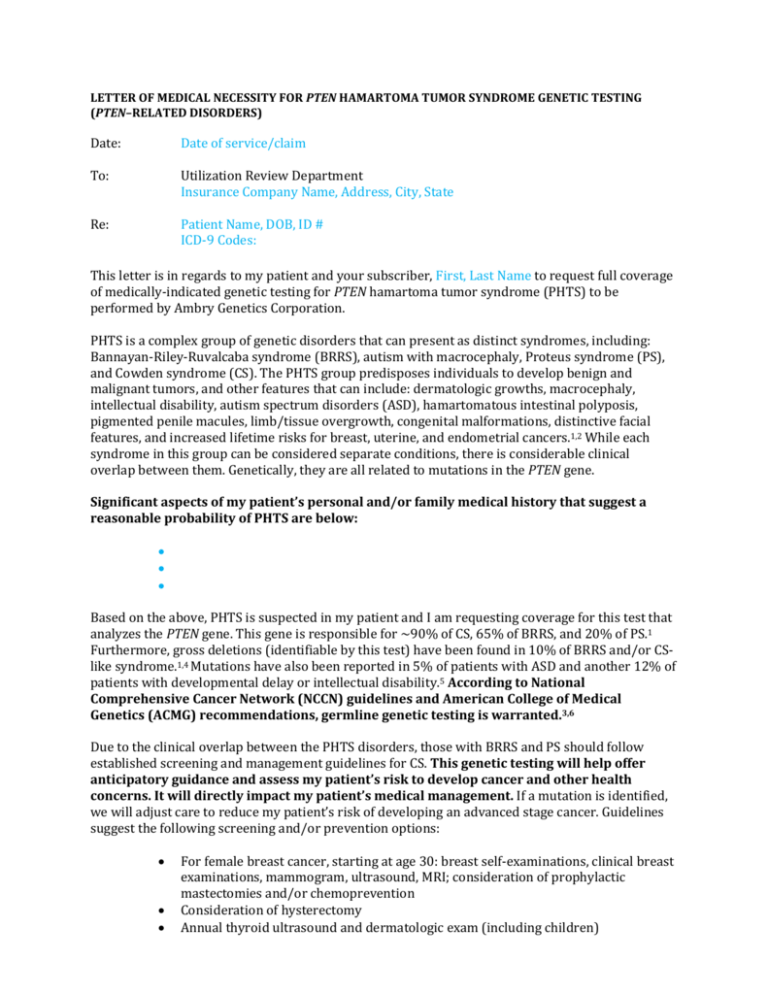
LETTER OF MEDICAL NECESSITY FOR PTEN HAMARTOMA TUMOR SYNDROME GENETIC TESTING (PTEN–RELATED DISORDERS) Date: Date of service/claim To: Utilization Review Department Insurance Company Name, Address, City, State Re: Patient Name, DOB, ID # ICD-9 Codes: This letter is in regards to my patient and your subscriber, First, Last Name to request full coverage of medically-indicated genetic testing for PTEN hamartoma tumor syndrome (PHTS) to be performed by Ambry Genetics Corporation. PHTS is a complex group of genetic disorders that can present as distinct syndromes, including: Bannayan-Riley-Ruvalcaba syndrome (BRRS), autism with macrocephaly, Proteus syndrome (PS), and Cowden syndrome (CS). The PHTS group predisposes individuals to develop benign and malignant tumors, and other features that can include: dermatologic growths, macrocephaly, intellectual disability, autism spectrum disorders (ASD), hamartomatous intestinal polyposis, pigmented penile macules, limb/tissue overgrowth, congenital malformations, distinctive facial features, and increased lifetime risks for breast, uterine, and endometrial cancers.1,2 While each syndrome in this group can be considered separate conditions, there is considerable clinical overlap between them. Genetically, they are all related to mutations in the PTEN gene. Significant aspects of my patient’s personal and/or family medical history that suggest a reasonable probability of PHTS are below: Based on the above, PHTS is suspected in my patient and I am requesting coverage for this test that analyzes the PTEN gene. This gene is responsible for ~90% of CS, 65% of BRRS, and 20% of PS.1 Furthermore, gross deletions (identifiable by this test) have been found in 10% of BRRS and/or CSlike syndrome.1,4 Mutations have also been reported in 5% of patients with ASD and another 12% of patients with developmental delay or intellectual disability.5 According to National Comprehensive Cancer Network (NCCN) guidelines and American College of Medical Genetics (ACMG) recommendations, germline genetic testing is warranted.3,6 Due to the clinical overlap between the PHTS disorders, those with BRRS and PS should follow established screening and management guidelines for CS. This genetic testing will help offer anticipatory guidance and assess my patient’s risk to develop cancer and other health concerns. It will directly impact my patient’s medical management. If a mutation is identified, we will adjust care to reduce my patient’s risk of developing an advanced stage cancer. Guidelines suggest the following screening and/or prevention options: For female breast cancer, starting at age 30: breast self-examinations, clinical breast examinations, mammogram, ultrasound, MRI; consideration of prophylactic mastectomies and/or chemoprevention Consideration of hysterectomy Annual thyroid ultrasound and dermatologic exam (including children) Consideration of neurologic exam in those diagnosed during childhood Colonoscopy every 5 years, starting at age 35 Renal imaging, starting at age 40 Additional screening based on family history Medical care will also be adjusted accordingly to address non-cancer medical concerns (such as congenital malformations and autism spectrum disorders). Due to the medical risks associated with PTEN mutations and interventions available to reduce these risks, this genetic testing is medically indicated. As such, I am ordering this testing as medically necessary and affirm that my patient/patient’s family has provided informed consent for genetic testing. A positive test result would confirm a genetic diagnosis and/or risk in my patient, and would ensure my patient is being managed appropriately. I am specifying Ambry Genetics Corporation because this laboratory has highly-sensitive and cost-effective testing for PHTS, along with a large database of previously tested patients to ensure highly validated, accurate, and informative test interpretation. I recommend that you support this request for coverage of diagnostic genetic testing for PHTS in my patient. Genetic testing can take up to several weeks to complete, and the laboratory will not bill until testing is concluded. Therefore, we are requesting that the authorization be valid for 3 months. Thank you for your time, and please don’t hesitate to contact me with any questions. Sincerely, Ordering Clinician Name (Signature Provided on Test Requisition Form) (MD/DO, Clinical Nurse Specialist, Nurse-Midwives, Nurse Practitioner, Physician Assistant, Genetic Counselor*) *Authorized clinician requirements vary by state Test Details CPT codes: 81321x1, 81323x1 Laboratory: Ambry Genetics Corporation (TIN 33-0892453 / NPI 1861568784), a CAPaccredited and CLIA-certified laboratory located at 15 Argonaut, Aliso Viejo, CA 92656 References: 1. 2. 3. 4. 5. 6. Eng C. PTEN Hamartoma Tumor Syndrome (PHTS). November 29, 2001 (updated January 23, 2014). In: Pagon RA, Adam MP, Ardinger HH, et al., editors. GeneReviews®. Seattle, WA: Univ. of Washington, Seattle; 1993-2014. Eng C. Will the real Cowden syndrome please stand up: revised diagnostic criteria. J Med Gen. 2000;37:828-830. NCCN Clinical Practice Guidelines in Oncology (NCCN Guidelines®). Genetic/Familial High-Risk Assessment: Breast and Ovarian. Version 2.2014, 09/23/2014. Zhou XP, et al. Germline PTEN promoter mutations and deletions in Cowden/Bannayan-Riley-Ruvalcaba syndrome result in aberrant PTEN protein and dysregulation of the phosphoinositol-3-kinase/Akt pathway. Am J Hum Genet. 2003;73(2):404-11. Varga EA, et al. The prevalence of PTEN mutations in a clinical pediatric cohort with autism spectrum disorders, developmental delay, and macrocephaly. Gene in Med. 2009;11:111-117. Schaefer GB and Mendelsohn NJ; ACMG Professional Practice and Guidelines Committee. Clinical genetics evaluation in identifying the etiology of autism spectrum disorders: 2013 guideline revisions. Genet Med. 2013;15(5):399-407.
